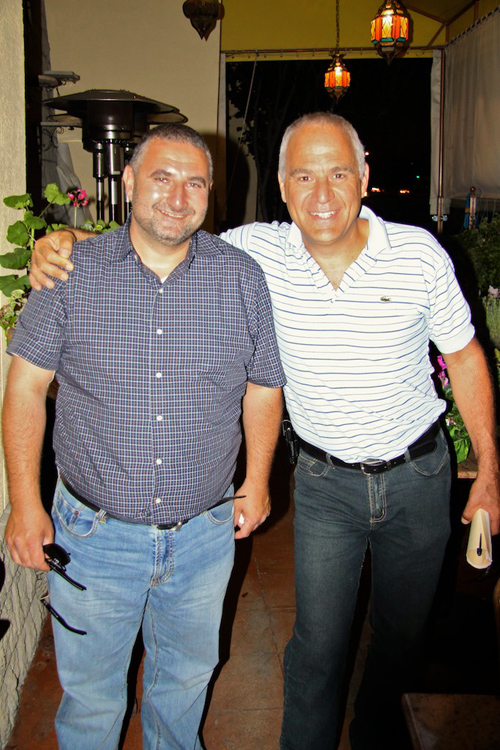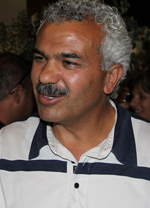
By Donald H. Harrison

LA MESA, California – Emad Ahmed Fuad Nuseibeh, a major Palestinian grower of vegetables and herbs, and Amir Gur-Lavie, an owner of Zeta, a large distributor of Israeli olive oil, cheerfully agreed to pose together following a dinner at Vine Ripe Market here. Nuseibeh and Gur-Lavie smiled warmly like old friends, whereas, in fact, they had only met a few days before.
The market and restaurant is part of a chain co-founded by Ali Baba Abdallah, a Palestinian refugee who had lived in Jordan and Lebanon before immigrating in 1982 to the United States, where he built a successful career as a grower and marketer.
The two men were among a group of Palestinians and Israeli Jews brought together through the combined efforts of the Peres Peace Center in Jaffa, Arab businessman Sam Husseini of Jerusalem, and the Hansen Institute for World Peace at San Diego State University. They and others met to discuss and to refine an idea that the Peres and Hansen groups have been developing over several years now: creating a blended olive oil made from Israeli and Palestinian olives to be sold as a “peace product” in U.S. stores.

If the project comes to fruition, the new brand may have a ready customer in Abdallah, whose store specializes in foods from the Middle East, both Arab and Jewish. Abdallah explained that in San Diego there are many immigrant communities who hunger for foods from home, and he makes it his business to satisfy their tastes. The chance for Arabs and Jews to peacefully mingle together as customers in his store is a side benefit paralleling the joint goals of the Peres Peace Center, the Hansen Institute and Husseini’s Lion Heart business development company, a new partner in the peace consortium.
As Abdallah had tray after tray of Middle Eastern appetizers, salads and entrees brought to the long table in a patio area alongside his market on Fletcher Parkway, the meeting was one for socializing amid the familiar tastes and aromas of the guests’ Middle Eastern homes.
The Palestinian and Israeli business people on that day had toured such markets as Ralphs, Whole Foods, Trader Joe’s, Henry’s and now Vine Ripe, to gain an insight into California food consumer tastes. The tour followed days of lectures and panels at San Diego State University on trends in the American food industry, as well as a visit to the Temecula Olive Oil groves in Aguanga, California. The group also had some recreational outings together, including the San Diego Zoo, Old Town San Diego State Historic Park, La Jolla and on the following day would visit the Star of India at the Embarcadero.
When the meal was done, Nuseibeh and Gur-Lavie both agreed to share their impressions with this reporter.
Like the other Palestinians at the meeting, Nuseibeh lives in East Jerusalem, now claimed by Israel but which could possibly become the capital of a new Palestinian state, depending on how direct peace talks between Israeli and Palestinian officials —scheduled to begin next month—settle the volatile question. Nuseibeh also owns a large farm near Jericho, where he grows various desert produce, and another where he produces herbs sold directly to the U.S. market.
The San Diego trip “was a great experience for me,” said Nuseibeh. “We have met great people who in fact are our neighbors but we didn’t know them until we reached here in the States. I hope that, after knowing them, how they are thinking and what kind of businesses they have, that we can do some business together, in order to cut, or break the obstacles that have prevented us from working together.”
Asked about creating special olive oils, that might blend Israeli and Palestinian varieties, and maybe even some of Nuseibeh’s herbs, Nuseibeh responded:
“I think it is a good idea to start a business together, but there are a lot of obstacles, a lot of problems,” that must be resolved first, he said. “We have to do things here in the States, a lot of work, a lot of research, and I don’t think at this moment that we as Israeli and Palestinian business people can come up with the money. I hope we can find a source for finance, and I think that with these ideas that we have—to work with good-willed people—we will be able to succeed.”
The Nuseibeh Agricultural Co. for Marketing and Production (NAMP) has for over a half century exported oranges to the United Kingdom, as well as a variety of citrus and bananas to Jordan and to the Gulf countries. When exports to Jordan slowed down, Nuseibeh developed herb products, which he sold to the Israeli market. Initially, sales to the U.S. market went through Israel, but now NAMP is shipping about $1 million annually in herbs directly to the United States.
The joint meeting in San Diego with Israeli agriculturalists was not limited to olives, Nuseibeh said.
“We are thinking of ways to combine the Israeli produce and the Palestinian produce,” and to devise “new ideas in order to work together for their benefit and our benefit,” he said. “At the end, it is business. So we are trying hard to find new things, new ideas. It may not be in olives, or vegetables, or herbs; maybe it is a new idea that could succeed.”
Indicating other Palestinians and Israelis seated at the table, Nuseibeh added: “Everyone has their own experience. Some of us have experience in marketing or in finding finance; others have experience in growing and having good, high quality produce, and so the thing is we have to find something that can work in order to succeed in this.”
Whatever products are eventually developed, Nuseibeh said the meetings are a harbinger of what real peace between Israelis and Palestinians might mean. “We need it for both of us, the Israelis and the Palestinians,” he declared. It is a need, it is a must. And when we are doing this, maybe it is a small step, but everyone profits, the Israelis and the Palestinians. You are going toward the same light at the end of the tunnel. Maybe what we are doing is a small step, but at the end, Palestinians and Israelis are people who want to reach that same light and to get to the end of this mess we have. It might help, this thing we are doing. We are not going against anyone. The peace process is going on; maybe it (the San Diego meeting) is a mile out of the million, but it is a mile.”
Gur-Lavie is the owner of Zeta in the Galilean town of Mitzpe Hila – known throughout Israel as the hometown of Gilad Shalit, the Israeli soldier who has been held in captivity for several years by the Hamas government in Gaza. Besides owning the company which produces three million bottles a year of olive oil, Gur-Lavie serves on a committee with Shalit’s parents trying to keep the issue of ending Shalit’s captivity before the world.
About the San Diego meetings, Gur-Lavie said: “I don’t know what will be the result, but the main goal we have already reached. It was wonderful. We (Palestinians and Israelis) had the possibility to sit together and to think together, and anyhow we have new friends, and we hope also to have new products for the grocery market. We need to find the way to do it. I am sure that we will find the way to do something—perhaps small, perhaps big—but actually the biggest thing, we already have done.
Bentzi Elisha, who is the chief executive officer of Zeta, added. “Sometimes we have to come to the States to find that we can be together and talk about everything, and laugh about the same things – really, because we became friends.”
The Hansen Institute has been quietly bringing Arabs and Israelis together—even in the absence of diplomatic relations between their countries – since the time following the Camp David accords between Israel and Egypt during Jimmy Carter’s presidency.
Bonnie Stewart, the executive director, has witnessed a process many times in which the Arabs and Israelis first regarded each other with suspicion and had to air out some of their political differences before getting down to business discussions.
Not so this meeting, commented Gur-Lavie. “We had heard this would happen… but we didn’t feel that, even at the airport. We started with friendship. Look, we also talk very openly about the problems. We know we can’t avoid the problems but we think that with friendship we are able to talk about it … We know that is from business that maybe we will be able to make the peace sooner. If we wait for the conflict to be solved, and then talk about business, maybe it will take 100 years.”
While creating a peace product is a relatively new idea, Gur-Lavie said that his company has been bottling both Israeli and Palestinian olive oils for years. Noting that his company recently won four Gold Medals in an international olive oil competition, he expressed confidence that something “unique and of a very high quality” eventually can be created and marketed.
Both Gur-Lavie and Nuseibeh had praise for San Diego State and the Hansen Institute specifically, and for San Diego generally.
Said the Israeli of San Diego: “It is a very nice and pleasant place to be. I have been in many places in America, but such a nice hospitality! All the Americans we are with from the Hansen Institute and the University are doing an excellent job. They believe that it is important to help us bring the peace, and I really just want to say thank you.”
Nuseibeh concurred, saying: “People in the Middle East know Americans in two or three things, in their bullets, in their bombs that say ‘made in the U.S.A.,’ and in their vetoes in the U.N. They don’t know the people, but this time and my last visit to the U.S., I met a lot of people and I found something else. I found people who want to help, people…who need to know how they can make the people in front of them as happy as they are…. If someone here is convinced by a cause, he will devote his life, money, fortune and time to the cause. And it doesn’t matter how much effort it will take. There are many people in the Middle East who do not know the Americans well; they should see the people, the American people.”
Besides Nuseibeh and Sam Husseini, other members of the Palestinian delegation included Abdel Muti Qutob, whose businesses include agriculture produce in the Auja region near Jericho, as well as real estate development elsewhere; and Rami Assali, financial and administrative manager for Search for Common Ground, a non-governmental agency in Jerusalem.
Israelis in addition to Gur-Lavi and Elisha included Ofer Ensher, managing director of Hefer Systems & Controls, which is a large company in the fields of water and waste water processes; and the following staff members of the Peres Center for Peace: Roi Dai, the finance director; Oren Blonder, director, and Moran Diment, manager, in the agriculture, water and environment department.
Numerous Americans interacted with the two delegations. Among those who participated in seminars with them were Stewart, the director of the Hansen Institute; Sanford Ehrlich, Qualcomm Executive Director of Entrepreneurship at SDSU’s Entrepreneurial Management Center (EMC); Alex DeNoble, chair of the Management department of SDSU’s College of Business Administration; Bernard Schroeder, director of EMC programs; Evan Schlessinger, president of the Springboard Company, which helps bring new products and innovations to market, and Marvin Spira, president of Marketing Consultants, International, which specializes in the marketing of food products.
*
Harrison is editor of San Diego Jewish World.